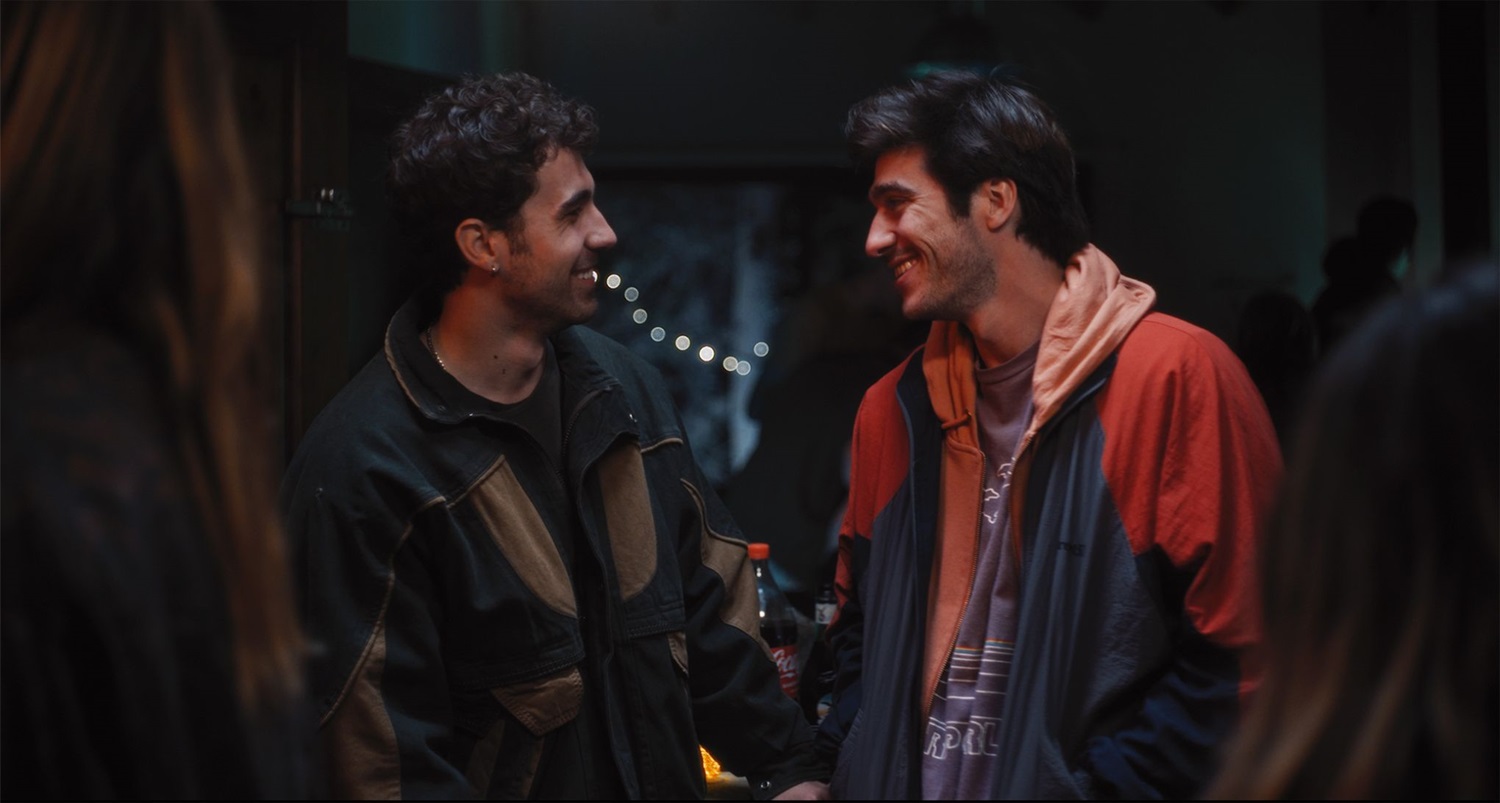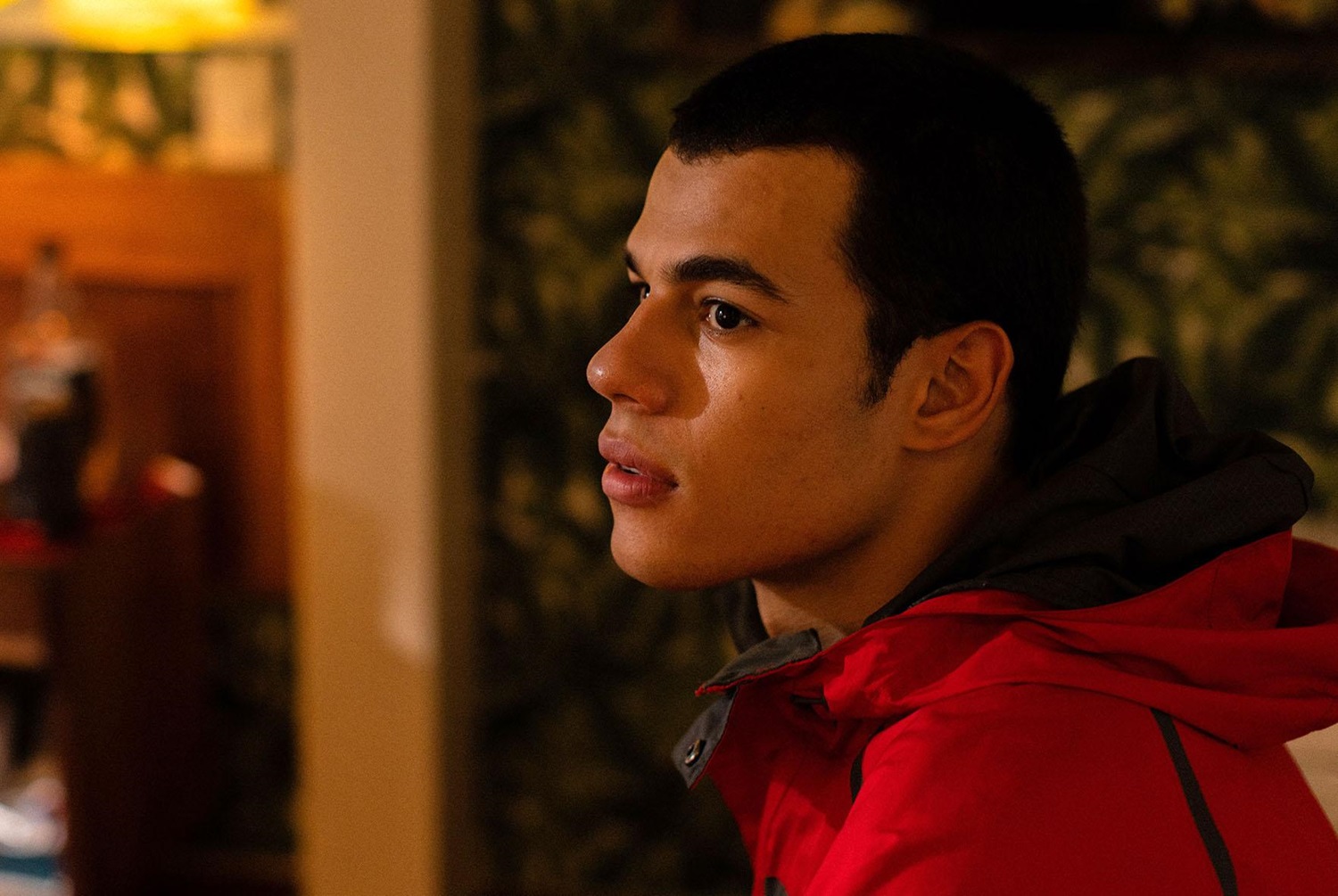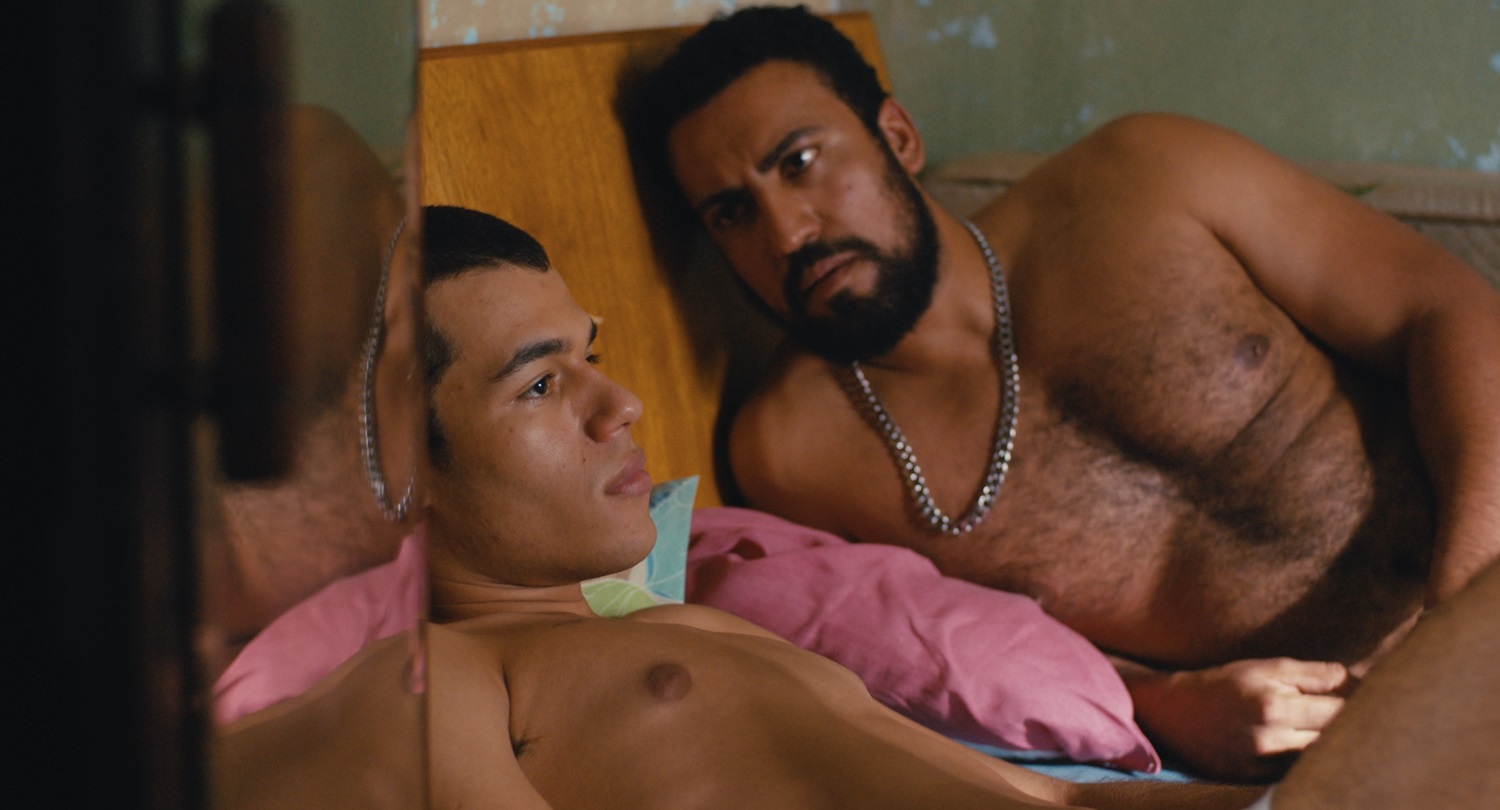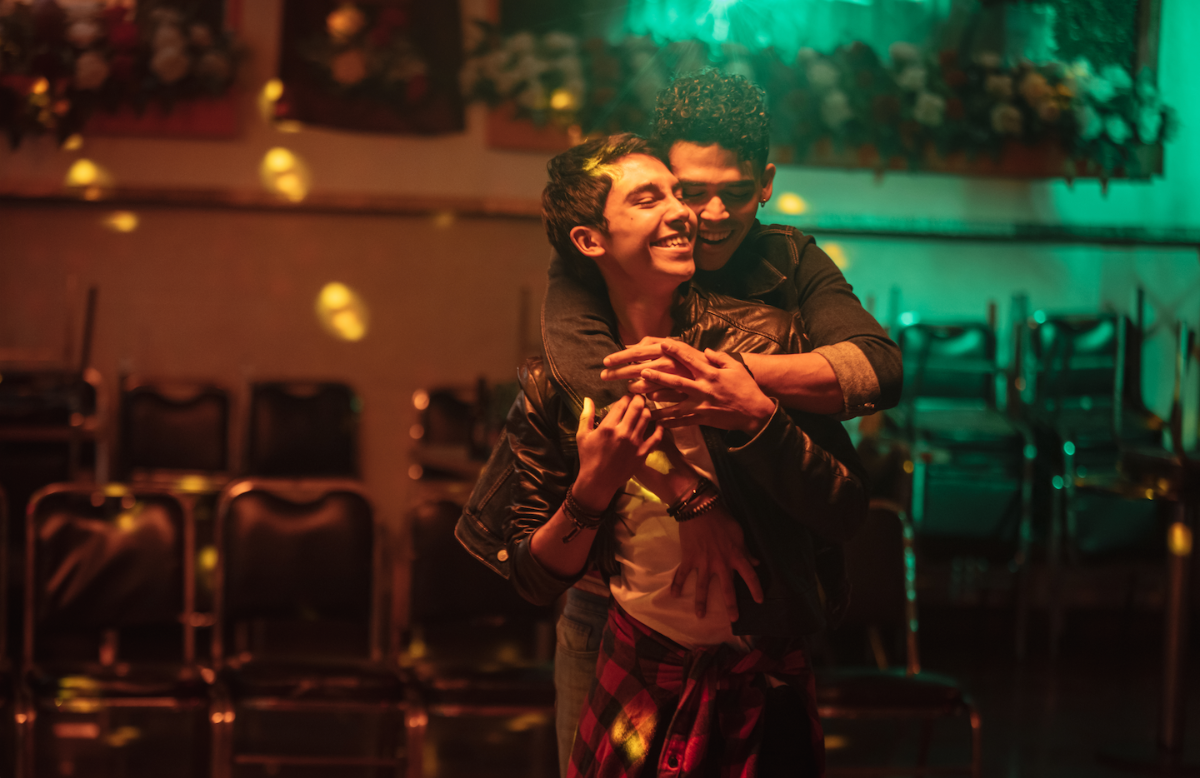Call it the triangle of desire. Three films showing this weekend as part of OUTshine Film Festival's fall edition feature good-looking, predominantly younger men navigating dangerous paths that may or may not end up in romantic fulfillment. They may find the lines dividing labels like “friend,” “lover,” “employer,” “flatmate” or “boyfriend” beginning to blur before their eyes. “It's complicated” doesn't begin to explain the dilemmas being dealt with in these imports hailing from Argentina, Brazil and Mexico.
OUTshine 2024 Part 2 heads to Miami from Friday, Oct. 25 through Sunday, Oct. 27, following eight days of screenings in Broward County. Social media coverage north of the county line has been plentiful, with smartphone-friendly vertical videos of enthusiastic crowds listening to Q&As with visiting talent and living it up at festive afterparties. The short clips convey the festival-fever thrill of a well-run, well-attended event, a home run that has struck a chord with the local community. And, as I wrote last week, the lineup is eclectic and neat.

Javier Orán as Pedro and Lautaro Bettoni as Maxi in a scene from "The Astronaut Lovers." (Photo courtesy of Sombracine/Mr. Miyagi)
But organizers' hard-sell PR push of their fall edition does not appear to tell the whole story. According to reports from attendees who spent the entire day at the festival this past Sunday, the twice-yearly continues to be beset by low attendance. A shorts program did pull in a decent crowd size, these festivalgoers said, but they also noted there were showings with anywhere between five and twenty people in attendance. Grim numbers, especially for a Sunday. This is a problem that also plagued the festival's Magic City-centric spring edition back in April.
Here's hoping, not only that this weekend draws bigger crowds to Silverspot Cinema and Regal South Beach, but that the festival's new management team resists the urge to pretend everything is hunky dory. The strong lineups that OUTshine Programming Director Joe Bilancio continues to put together, more interesting and diverse than what the Miami Film Festival has assembled in recent years, deserve to find a consistent and faithful viewership that ensures no festival selection plays to nearly empty auditoriums.
Myriad factors are at play here, including moviegoer apathy, but I think the interest is nevertheless OUT there, OUTshine folks. The key, I think, is to increase OUTreach to the communities being represented in these international titles and, more importantly, to rope in cinephiles of all persuasions and backgrounds to attend an event that wouldn't normally even be on their radar. The painfully OUTdated word “niche” should not be in anyone's vocabulary. In other words, hetero movie buffs will show up to good movies, and there are plenty in this year's crop with crossover appeal. It's clear there aren't enough butts in seats beyond a handful of weekend and gala slots. It remains to be seen whether or not the people running OUTshine will step up to the plate and go the distance.
Because the event formerly known as the Miami Gay & Lesbian Film Festival is worth fighting for, as evidenced by some of the selections screening during the tail end of the fall edition. Let's take a closer look at the aforementioned trio of titles, which include one of the best films I've seen in 2024.
“The Astronaut Lovers”: When is a boy-meets-boy rom-com not your typical boy-meets-boy rom-com? When one of the boys in question insists he doesn't play on the same team, and has an estranged former girlfriend as his Exhibit A.
The immense appeal of this balmy summertime tale, another winsome hangout movie from Argentinean writer-director Marco Berger, can be summed up in three little words: wordplay as foreplay. The young men at the center of this zesty battle of wills like to talk, and then talk some more. The disses and putdowns fly fast and furious, and almost all of it is flirting, so much so that it's hard to pinpoint when the jokes end and the truth bombs begin.
This beach holiday starts in deceptively perfunctory fashion, as in several previous Berger joints. Pedro (Javier Orán), a cute Spaniard in his twenties, crosses the pond to visit his cousin. We soon learn Pedro lived in Argentina between the ages of 10 and 14, before his family moved back to Spain. It doesn't take long for him to cross paths with Maxi (Lautaro Bettoni). Maxi and Pedro hung out back in the day, even went to camp together.
But Berger is not interested in their shared childhood. Within minutes of having reconnected, Maxi rips off the Band-Aid in blunt fashion.
“So you're gay now?” Maxi asks Pedro while they're out sunbathing. Pedro is taken aback and calls him out. Maxi, a bright-eyed looker with an impish tendency to push people's buttons, then tells Pedro he “doesn't look gay.” Pedro, a boy next door with expressive baby browns and a killer smile, snaps back, “If I were an an astronaut, I don't know if you'd tell me I don't look like one.” Central metaphor in place, the game is afoot.
The ensuing banter is by turns fanciful, crude, tender, inquisitive and philosophical, and even though the double-entendres are doled out with rat-tat-tat abandon, the budding friendship feels strangely wholesome throughout. To put it another way, “The Astronaut Lovers” is a modern-day spin on a classic remarriage comedy from the 1930s that nevertheless retains Berger's trademark earthy naturalism. It's a li'l bit Hollywood, a li'l bit indie.
The complication that kicks things up a notch for these buddies with the intoxicating sexual tension happens when Maxi runs into his ex, then tells her that he and Pedro are a couple as part of a ploy to make her jealous. It's clear these dudes as playing with fire, committed as they are to maintain this facsimile of a courtship. “Someone is bound to get hurt,” you might hear a little voice whisper in the back of your head.
But after making “Horseplay,” a potent takedown of male toxicity that was released stateside last year and is his darkest film, Berger is in no mood to bring the hammer down. The “Blond One” auteur deconstructs the infatuation gay men develop toward their straight male friends without undermining the emotions, real ones, not pretend, that these characters feel for each other. The chemistry is everything in a movie like “The Astronaut Lovers,” and Orán and Bettoni make it look effortless. Seeing the stars engage in these affectionate verbal duels is like a drug. It generates the special kind of high that only the best romantic comedies can give.
One might take issue with Berger's decision to dial down the sex and nudity, but it's a testament to his mad skills behind the camera that the more explicit content is not missed. Because in “The Astronaut Lovers,” a clever turn of phrase counts as a caress, and a barb that's a compliment in disguise is the most satisfying kiss. There are those who may be compelled to call this absolute banger repetitive or inconsequential. I'll just go ahead and call it wonderful.
“The Astronaut Lovers” screened Friday, Oct. 25, at the Silverspot Cinema in downtown Miami as a Latin Spotlight Film and was followed by an afterparty at the multiplex.

João Pedro Mariano as Wellington in a scene from "Baby." (Photo courtesy of Dark Star Pictures/Uncork'd Entertainment)
“Baby”: The troublemaker is fresh out of juvie and finds out those in his life have moved on in his absence. Literally.
Wellington (João Pedro Mariano) has completed a nearly two-year stint at a São Paulo detention center, only to discover his parents have moved out without leaving any contact information behind, leaving the 18-year-old high and dry. The clear-eyed portrait of life on the margins that follows works simply because director Marcelo Caetano puts his characters before the social issues he tackles. And that means the movie never falls into the “calamity porn” pitfalls that ruin too many other dramas about life in the streets.
We learn from Wellington's friends, if they are to be believed, that the crime he committed, an extreme form of vandalism, merited time behind bars. After a couple of nights spent sleeping in benches, the wayward lad and his posse barge into a porn theater that incidentally features a poster for “The Fluffer,” an OUTshine selection from the early 2000s. This late-night stop sets Wellington on a collision course with Ronaldo (hunky Ricardo Teodoro), a beefy hustler that catches the protagonist's eye.
Ronaldo, a young 42, takes the homeless punk under his wing and promptly puts him to work, initially to turn tricks and eventually to help him deal coke on the streets. Using one's real name is a no-no, so that's where Wellington's titular nickname enters the picture. There is mutual admiration between both men, as well as an undeniable attraction, age gap be damned, but Ronaldo's insistence that his twink escort is always “working” sets off Wellington's hair-trigger temper. After all, he can't be “Baby” all the time.
Wellington's arc follows a familiar pattern of falling out and reconciliation with his employer/crush, with some tiffs involving shady underworld figures underscoring the narrative's shopworn nature. But, and this is an important but, Caetano fills the screen with lived-in details that keep the film gripping. The filmmaker also leaves little to the imagination when it comes to the more uncompromising parts of sex work, depicting the copulations as just another day on the job.

João Pedro Mariano as Wellington in a scene from "Baby." (Photo courtesy of Dark Star Pictures/Uncork'd Entertainment)
“Baby” never feels like exploitation, and in this sense, it suggests what a Sean Baker movie would be like if the “Red Rocket” and “The Florida Project” director stopped fetishizing the squalor of his working-class settings. By contrast, Caetano, working with cinematographers Joana Luz and Pedro Sotero, creates a look for “Baby” that splits the difference between slick and gritty. It brings formal balance to this story of a screw-up determined to get his act together. By any means necessary.
“Baby” screens Saturday at 7:15 p.m. at the Silverspot Cinema in downtown Miami as a Men's Spotlight Film. It is also followed by an afterparty at the multiplex.
“Demons at Dawn”: The hustle and bustle of Mexico City can feel like the world's biggest playground, or a soul-sucking urban trap, in writer-director Julián Hernández's latest erotic odyssey. Orlando (Luis Vegas), a dance student with a high sex drive and a side gig as a go-go boy, locks eyes with nursing student Marco (Axel Shuarma) on his way to class, and both are instantly smitten.

Axel Shuarma as Marco and Luis Vegas as Orlando in a scene from "Demons at Dawn." (Photo courtesy of The Open Reel/Mil Nubes Cine)
Things move at warp speed for the lovebirds, as Orlando takes the plunge and moves into Marco's cozy flat. “I'll never stop loving you,” the gifted dancer tells Marco in the throes of passion. The new couple's honeymoon phase brings out Hernández's penchant for dreamlike imagery, and he intersperses these moments of bliss with more straightforward scenes showing the young men hard at work pursuing their chosen professions, including a subplot where Orlando auditions for a dance-themed reality series.
For roughly half the film, it appears as if Hernández has justified the film's 2-hour-and-15-minute runtime, but once the pressure from juggling a relationship with their busy schedules ramps up, Orlando and Marco's “amour fou” hits the skids, and that sends “Demons at Dawn” into a tailspin. The film begins to go in circles as these boyfriends try to convince themselves and each other that nothing is wrong, while Hernández hits the bad-vibes chords over and over. The moping becomes oppressive.
Is this a breakup in slow motion, or an extended rough patch? Orlando and Marco rush into a relationship without knowing much about each other beyond their sexual compatibility and how good it feels when they're together, but that also extends to the viewer. We know very little about these characters, so we end up not caring whether or not they manage to get back together.
Hernández, who's no stranger to OUTshine audiences, remains a stylish storyteller. Fluid camerawork and a bright color scheme keeps “Demons at Dawn” interesting from a visual point of view, but he's unable to prevent this overlong love story from becoming tedious. When the filmmaker inserts a musical number complete with bad lip syncing, it sticks out like a sore thumb because it feels like something from a completely different (and more fun) movie.

Axel Shuarma as Marco and Luis Vegas as Orlando in a scene from "Demons at Dawn." (Photo courtesy of The Open Reel/Mil Nubes Cine)
It becomes more and more difficult to tell whether something being depicted is happening in the characters' heads or whether it's happening for real, and as a result, the film's resolution feels so abstract that it fails to resonate. You feel the movie slipping from Hernández's fingers. We get it: Love hurts, especially when you're young, but the road for this couple is so prolonged and punishing that it ends in disappointment. For us, not them.
“Demons at Dawn” screens Saturday at 9:30 p.m. at the Silverspot Cinema in downtown Miami.
For tickets and information on other films showing this weekend as part of OUTshine Film Festival's fall edition, go to outshinefilm.com.




